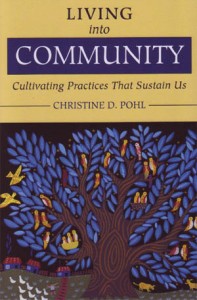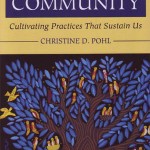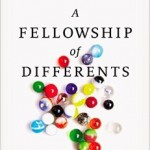 This is the second in an Advent series of eight posts that will wind their way through Christine Pohl’s new book Living into Community: Cultivating Practices that Sustain Us (Eerdmans 2012 Buy now: Amazon // Kindle ). This book was chosen as The Englewood Review’s Book of the Year for 2012, and as I hope will become abundantly clear over the Advent season, it fits very well with what John and I have been describing as Slow Church.
This is the second in an Advent series of eight posts that will wind their way through Christine Pohl’s new book Living into Community: Cultivating Practices that Sustain Us (Eerdmans 2012 Buy now: Amazon // Kindle ). This book was chosen as The Englewood Review’s Book of the Year for 2012, and as I hope will become abundantly clear over the Advent season, it fits very well with what John and I have been describing as Slow Church.
[ Read an Excerpt of LIVING INTO COMMUNITY ]
In the season of Advent, we await the coming of Jesus, in whom healing and transformation is brought to creation. We celebrate that he has come already, and yet await and yearn for the completion of his reconciling work. In Living into Community, the first practice that Christine Pohl addresses is that of gratitude, and a key part of her introduction to this practice is an exploration of the ways in which gratitude forms us in ways that are contrary to the prevailing entitlement of our times. She observes:
Despite the emphasis on gratitude in the biblical texts, Christian tradition, and other great traditions, today it is often countercultural to take the posture of grateful recipient. Some of us operate with a well-developed sense of entitlement, quite certain that we deserve good things and are entitled to the best that “life” has to offer. Others of us, because we work hard, are convinced that we have earned the good that has come to us.(27)
Pohl goes on to describe four facets of the challenge of gratitude in our times:
1) Entitlement. Recognizing that entitlement can be healthily connected to a sense of dignity and equality, she goes on to emphasize that most of what we know of entitlement in Western consumer culture is exaggerated and unhealthy. Because we generally — unlike most of human history before us — we live in relative security, we have come to see ourselves as entitled to that security, and the pleasures that can be enjoyed within its confines. “Dissatisfaction as a way of life is encouraged by a consumerist culture that feeds notions of entitlement. We want more, and we want better — better bodies, newer cars, bigger churches, more beautiful homes, finer coffee. Somehow wanting these things morphs into the sense that, really, we deserve them. A cycle of generalized dissatisfaction fuels envy, striving and buying.” (28)
2) Self-Made and Not Indebted. Although this book was published prior to the peak of the 2012 election season, it critiques a major theme that emerged in the election, the idea that anyone has succeeded without the help of the government or others. “We have imagined,” she says, “that we are most fully human or successful when we are self-sufficient. Gratitude is an uncomfortable reminder that we need other people and that our lives are dependent on their gifts and generosity.” (28)
3) Contractual Relations. Much of the work we do is governed by contractual agreements, and therefore when the other party does what they’ve agreed to do, we rarely are filled with gratitude. Pohl raises pointed questions here; we definitely have good reason to be grateful when things work as they should, but we all too often become angry and ungracious when things do not work out as we have arranged. And even when we do not have literal contract, we are often swept away by contractual thinking. These points about contracts will be explored further in later chapters on promise-keeping.
4) Too Busy to Say Thanks. I’ll let Pohl speak for herself here: “Gratitude and wonder are squeezed out when our lives are packed full with busyness and responsibilities. There is simply no room, no time to notice. We experience God’s gifts when we pause long enough to notice them, suggesting important but often overlooked connections between Sabbath and gratitude. Our busyness is often tied to working very hard so that what we have or receive does not seem like a gift. … Schedules have no space to accommodate things going wrong, and we are unable to receive any gift that might come in the form of an interruption.” (30).
———
In the Sabbath-like space of this Advent season, as we long for the coming of Christ, and the mature embodiment of his Kingdom here on Earth (as it is in Heaven), may we reflect on all that we have to be grateful for — God and our fellow humans whose kindness, grace and generosity have made our present lives possible. Pohl suggests that as we cultivate the practice of gratitude in our lives, going against the grain of entitlement in our consumer culture, we will begin to embody a new kind of life, one that is rooted in the the abundance of the Giver of all good gifts.












